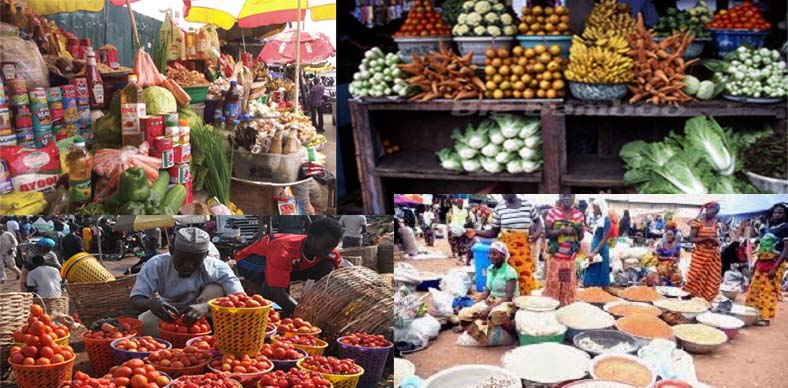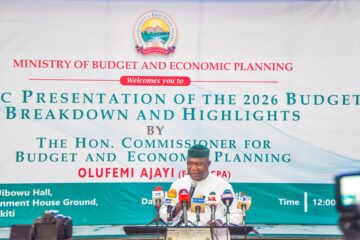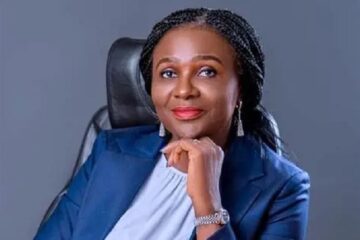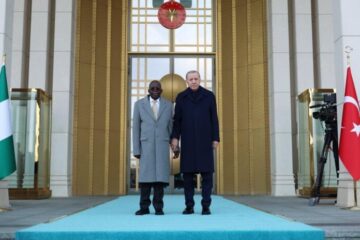
Food market
The World Bank has released the Nigeria Development Update report, offering a bleak outlook on poverty in Nigeria, as it stated that over 129 million Nigerians now live below the national poverty line.
It released the report on Thursday in Abuja as Nigerians lamented the worsening hunger nationwide, and wondered when the country’s ballooning rate of inflation would slow down.
The global financial body’s report revealed that the over 129 million Nigerians who now live below the national poverty line represented a sharp rise from 40.1 per cent in 2018 to 56 per cent in 2024.
The World Bank report read, “With growth proving too slow to outpace inflation, poverty has risen sharply. Since 2018, the share of Nigerians living below the national poverty line16 is estimated to have risen sharply from 40.1 per cent to 56.0 per cent.
“Combined with population growth, this means that some 129 million Nigerians are living in poverty. This stark increase partly reflects Nigeria’s beleaguered growth record. Real GDP per capita has not recovered to the level it was at prior to the oil price-induced recession in 2016.
“The COVID-19 pandemic compounded this drop in economic activity. Moreover, growth is failing to outpace inflation: large increases in prices across almost all goods have diminished purchasing power.”
It added, “Multiple shocks in a context of high economic insecurity have deepened and broadened poverty, with over 115 million Nigerians estimated to have been poor in 2023. Since 2018/19, an additional nearly 35 million people have fallen into poverty, so that more than half of Nigerians (51.1 per cent of the population in 2023) are now estimated to live in poverty.”
It was observed that there was an increase from 115 million in 2023 to 129 million in 2024, which means that 14 million Nigerians have become poorer this year.
The Washington-based bank attributed this surge to inflation, poor economic management, and external shocks.
“Several shocks have contributed to this major increase and changing profile of the poor: the COVID-19 recession, natural disasters such as flooding, growing insecurity, the high cost of the demonetization policy in Q1 2023, high inflation, and low economic growth.
“Previous domestic policy missteps compounded the effects of the shocks, particularly rising inflation, eroding the purchasing power, especially of urban households, pushing many into poverty. The government is ramping up the cash transfer programs to support economically insecure households to help weather the crisis,” the report noted.
It further revealed that while poverty remained a rural phenomenon, urban poverty had grown significantly, with 31.3 per cent of urban dwellers now living in poverty, up from 18 per cent in 2018.
In his presentation, Alex Sienaert, the World Bank’s lead economist for Nigeria, said Nigeria needed more productive jobs as more employment did not translate to reduced poverty.
He also said that the increase in minimum wage would only impact about four per cent of Nigerians.
He noted, “The Federal Government of Nigeria increased the minimum wage, which will affect only a small share of the population. Raising the minimum wage directly affects only 4.1 per cent of working age Nigerians.”
He further stressed the importance of creating productive jobs to tackle poverty, noting that employment alone is not enough unless the jobs are well-paying.
The new World Bank report also noted, “Being employed, however, is no guarantee of being able to escape poverty. Many jobs are not productive and therefore remunerative enough to afford a life beyond poverty.”
It added, “Jobs hold the key to sharing the proceeds of growth. Since Nigeria has a young and growing population, the jobs that can harness the country’s potential ‘demographic dividend’ are needed now.”
Sienaert also dismissed claims that the institution seeks to keep Nigeria economically dependent.
“I’m in this position of having been the lead economist at the World Bank here in Nigeria on economic policy issues for two years now, and I just want to tell you that I’ve not seen any conspiracy within the World Bank or otherwise to keep Nigeria down,” Sienaert said.
He added, “The World Bank is here to help, I’m here to help. Our whole team is here to help. We’re here to provide advice and low cost financing in support of Nigeria getting its own house in order for its own sake.”
He pointed out that Nigeria’s fiscal deficit had shrunk from 6.2 per cent of GDP in 2022 to 4.4 per cent in the first half of 2023, thanks to reforms such as the removal of FX and fuel subsidies.
Meanwhile, the World Bank Country Director for Nigeria, Dr Ndiame Diop, urged the Federal Government to sustain its reforms, warning that reversing them would be disastrous.
Diop cautioned that “reversing these reforms would be detrimental and would spell doom for Nigeria.”
He acknowledged that the reforms are difficult but essential to stabilise the economy.
Diop also noted that the World Bank is willing to offer Nigeria more loans as well as technical assistance in support of ongoing reforms.
Answering a question about whether the World Bank will keep providing loans to Nigeria, Diop said “Yes, we do have in the pipeline for this fiscal year several projects financed by the World Bank. These are government projects, implemented mostly by the states.”
He added, “Nigeria is a very important partner for the World Bank. We have been providing technical support, but also financing. But what is really important is that our financing comes with technical support and implementation support, and really making sure things go according to plan.”
The Minister of Finance and Coordinating Minister of the Economy, Wale Edun, expressed optimism about the country’s economic trajectory.
Edun argued that Nigeria is “turning the corner,” crediting efforts by the Central Bank of Nigeria to stabilise monetary policy and manage exchange rates.
He said, “Nigeria is already turning the corner. When you look at the figures, what has been done in terms of monetary policy by the governor of the central bank, ably assisted, I may say, by the fiscal side, coping with those heightened interest rates, all in a bid to get the economy stable.”
He further disclosed that the government plans to stimulate job creation through a housing finance initiative that offers near-single-digit mortgage rates.
The minister said that the removal of the subsidy has helped ease the burden that subsidy puts on Nigeria’s Gross Domestic Product.
“The key thing here is that for the first time in 40 years, the vexed issue of fuel subsidy, and linked to it, the foreign exchange subsidy, costing five percent of GDP has gone,” Edun said.
The finance minister also emphasised the Federal Government’s commitment to maintaining its course.
He stated, “Any effort that is not sustained will be a waste. Together with the Governor of the Central Bank of Nigeria and the Minister of Budget and National Planning, we’ve been discussing how to stay on course, tackle inflation, and ensure we move in the right direction.”
In defence of the recent interest rate increase, CBN Governor Olayemi Cardoso explained that the hike was necessary to tackle inflation.
“Ours will be to continue orthodox monetary policy and use our tools to ensure that we can bring price stability to our economy,” Cardoso said, adding that the CBN has successfully increased foreign exchange inflows from $200 million to $600m.
He clarified that the exchange rate is driven by economic fundamentals, not determined by the central bank.
“The CBN doesn’t determine the exchange rate. The fundamentals do. We will provide policies to make sure the policies are there in the market,” he said.
“The confidence in the naira is gradually returning as a result of the policies that we are already undertaking, which goes back to the whole issue of Orthodox monetary policy, that is really what begins to encourage people to hold onto naira,” he added.
He also noted that although the bank will not continue any quasi-fiscal intervention, it plans to complete any pending or unfinished ones.











